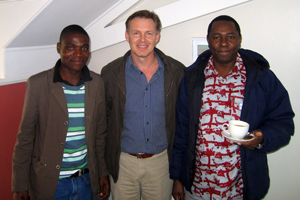Human and baboons '“ Developing solutions for Africa
29 July 2011 | Story by Newsroom Looking for solutions: Assoc Justin O'Riain (middle), flanked by Rendani Malaudzi (left) and Dr Chris Musyoki, together at the recent workshop.
Looking for solutions: Assoc Justin O'Riain (middle), flanked by Rendani Malaudzi (left) and Dr Chris Musyoki, together at the recent workshop.
Unlike many wildlife species, baboons may actually thrive in human modified environments as a result of the abundant and easily accessible food found in both rural and urban human settlements.
Ironically it is their similarities with humans, including highly plastic behaviour, a generalist diet and living in extended family groups, which have enabled them to gain pole position on the human-wildlife conflict scale in Africa. Here on the Peninsula a similar status has been achieved and understanding the causes, extent and severity of this conflict has provided the impetus for 16 postgraduate research theses in the past six years.
These have been supervised by Associate Professor Justin O'Riain, of the Baboon Research Unit at UCT, and an array of international collaborators.
Recently O'Riain used funds from a R400 000 grant from the Programme for the Enhancement of Research Capacity (PERC) to host an international workshop at UCT titled Pioneering sustainable solutions to human-baboon conflict: local answers to a continental challenge.
International leaders in human-baboon conflict research, including behavioural ecologists, primatologists, social anthropologists, conservationists and wildlife consultants, attended. The keynote address was delivered by Professor Shirley Strum, of the University of California, San Diego, who has over 30 years of research experience with baboons, raiding behaviour, and conservation in Africa.
The workshop included local researchers from UNISA and the University of Venda, in addition to local conservation authorities (City of Cape Town, SANParks and the Nature Conservation Corporation). Dr Charles Musyoki from Kenya Wildlife Service, who has extensive experience in managing a diverse range of wildlife conflict in Africa, provided a practical compass to the delegates for the application of research findings and theory to conflict mitigation practice.
Among the goals of the workshop were an improved understanding of human-baboon conflict both locally and in other parts of Africa; devising individual, troop and population level management strategies to reduce conflict; and establishing a human-baboon conflict network.
The workshop provided an excellent opportunity for an external audit of the research approach and scientific findings of the Baboon Research Unit. The unit received high praise for its comprehensive and inclusive research approach, in addition to their commitment to social responsiveness on the Peninsula and in the Overberg.
The workshop highlighted the urgent need for a better understanding of the human side of the conflict, including an assessment of the current perceptions on the Peninsula towards baboons and their management.
O'Riain is collaborating with social anthropologist Dr Samantha Hurn to focus attention on human-baboon interactions. He has established a human-baboon conflict network that will meet regularly in cyberspace to develop skills appropriate to a most vexing challenge.
 This work is licensed under a Creative Commons Attribution-NoDerivatives 4.0 International License.
This work is licensed under a Creative Commons Attribution-NoDerivatives 4.0 International License.
Please view the republishing articles page for more information.










